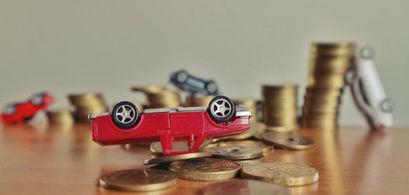Rising fuel prices, longer terms on loans, and rolling-over debt from prior vehicles can all contribute to a condition known as an upside down car loan. When this happens during a credit crunch, it's hard for consumers to escape this financial burden.
In this article, we're going to discuss what are called "upside down car loans." We'll provide a detailed definition of this term, explain how this can happen to consumers, and discuss some strategies borrowers can adopt to get out of this condition.
What is an Upside-Down Car Loan?
An upside-down car loan goes by many names. Sometimes they're referred to as "underwater loans," but perhaps the most descriptive term is a "negative equity" position in a car. Whatever it's called, the term simply means the car's owner owes more to creditors than it's worth if it were sold, or negotiated during a trade-in deal.
Fundamentally, everyone understands that a car depreciates over time. That is to say, as the car ages, the value of the car decreases. Collectible cars may be an exception to this rule; but, in general, the more miles someone drives a vehicle, and the longer they own it, the less it is worth on the marketplace.
Rapid Decrease in Value
Even under normal conditions, a car's value will decrease over time. But what many consumers don't realize is that when this value drops below the remaining principal balance on their car loan, they've gone upside-down. The car's value has dropped to the point that if they were to sell the vehicle, they wouldn't have enough money from the sale of the car to pay off their loan.
There are a several conditions, or causes, of upside down car loans. Some of these conditions are caused by the driver / owner of the vehicle, while others are the result of market conditions:
Fuel Prices: a rapid rise in fuel prices can result in a rapid decrease in the value of gas-guzzlers. The value of sports utility vehicles (SUVs), and trucks are especially vulnerable to fuel prices due to their lower MPG fuel efficiency.
Long Commutes: since a car's value is a function of both the age of the vehicle as well as mechanical wear, long distance commuters can rack-up a considerable number of miles driving back and forth to work each day. This rapidly lowers the value of their cars too.
Poor Satisfaction Ratings: if a certain make or model of a car gets poor customer satisfaction ratings from existing owners, usually because of poor quality or design, the depreciation rate of that vehicle may drop faster than average.
Small Down Payments: while it may be more desirable to make a small down payment on a car, the owner automatically starts out with less equity than consumers that are willing to put down more money.
Debt Rollover: even worse than a small down payment, rolling-over a prior car loan's balance into a new loan only makes the problem worse.
Long Payment Terms: finally, the longer it takes to pay down a car loan, the greater the chances the loan will go upside down as the table below demonstrates.
Upside-Down Car Loan Example
3-Year Loan | 4-Year Loan | 5-Year Loan | |
Price Paid for Vehicle | $22,000 | $22,000 | $22,000 |
Monthly Payments | $679.30 | $526.82 | $435.63 |
Ending Principal | $7,850.71 | $11,766.52 | $14,108.40 |
Ending Vehicle Value | $14,000.00 | $14,000.00 | $14,000.00 |
Equity in Car | $6,149.29 | $2,233.48 | $(108.40) |
This example illustrates how the length of a loan can turn it upside-down. Here we're showing a $22,000 loan carrying a 7.0% interest rate at the end of 24 months. At the close of this timeline, the car is now worth only $14,000; however, the five-year loan still has $14,108 of principal remaining.
Reducing the Chance of Negative Equity
If a car is worth less than owed to creditors, there are several tactics that can help relieve this problem:
Gap Insurance: if more is owed on the vehicle than a car insurance company will pay, then it may be the right time to buy gap insurance, which provides coverage for the difference between what is owed on a vehicle and what an insurance company says it is worth in the event the car is involved in a serious accident.
Larger Down Payments: before buying a car, truck, or SUV, make sure the vehicle is affordable. A large down payment significantly reduces the chance that an owner winds up with negative equity in their car. While a 10% down payment is good practice, putting 20% down is even better.
Shorter Loans: the higher monthly payment associated with shorter terms on a car loan will help to ensure the pay-down of principal isn't outpaced by the rate of the car's depreciation in market value.
Keep the Car: if the car is held long enough, the loan will eventually be paid off. At some point, the negative equity will reverse itself, and the owner will start to build positive equity in the vehicle once again.
Anyone that's desperate to get out of an upside-down car loan right away really only has one viable option: sell the car. Even if the car is sold, the loan still needs to be paid off. So in the end, the better approach might be to hold onto the car and continue to pay off the loan.
Car owners that believe the best alternative is to stop payments and have the vehicle repossessed should think twice before taking this approach. The laws in many states allow a creditor or lessor that has followed the correct repossession, and subsequent sale of the car, process to sue an owner to collect the monies required to pay-off any outstanding balance on the loan. By allowing the car to be repossessed, owners are needlessly harming their credit scores, and may even wind up paying attorney fees too.
